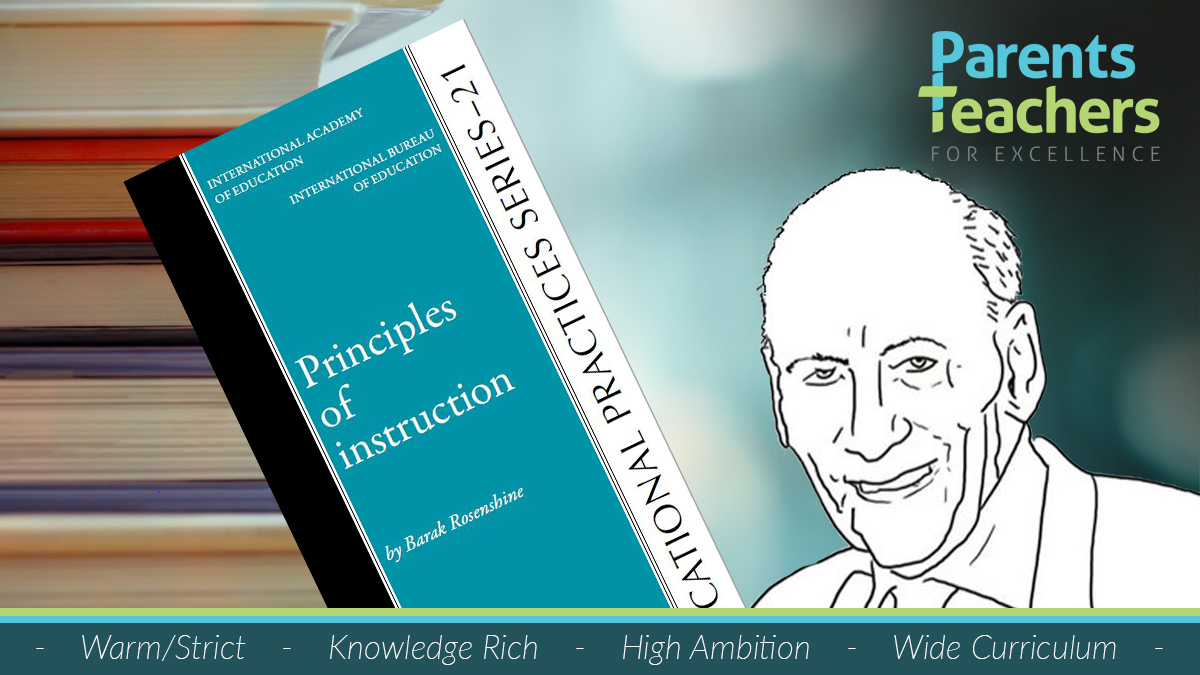The PTE Newsletter – Friday 11 June
Well done on making it through to Friday. The first week back after a break is always especially tiring, and with the weather having now switched from miserable to hot, it will have been especially wearing in our schools. Hopefully our readers will get some rest this weekend and a chance to enjoy the sunshine with friends and family!
This week’s Review – Barak Rosenshine’s “Principles of Instruction”
This week’s classic is not actually a book but a 2010 booklet that later became a 2012 article in the journal American Educator – Barak Rosenshine’s “Principles of Instruction”.
It is probably one of the most influential pieces of educational research of recent times. You won’t find a great school or department that doesn’t have it, or the principles within it, covered by their staff reading list or training programme. So what does Principles of Instruction cover and why has it proved so impactful?
It is a very simple, clearly written summary of what relevant research has to say about effective teaching, pulled together as ten key principles. These cover practical, down-to-earth things such as “Daily review”, “Present new material using small steps”, and “Obtain a high success rate”.
Each principle is explored and explained, both in terms of the research underpinning it, and consequences for the classroom. Concrete examples of practice are given so that the reader can picture how the principle could be implemented. And, um, that’s it.
But that’s its beauty and why it has been so influential – it does exactly what it says on the tin, and doesn’t overcomplicate things. READ MORE HERE
Latest news & views
Responding to the criticism of last week’s COVID recovery funding, Nick Gibb told the House of Commons that the government is “ready to spend to deliver on our commitment to education” and that more money was “coming down the track”. He also repeated education secretary Gavin Williamson’s announcement that there will be a review into extending the school day.
The Teacher Assessed Grades issue continues to make news. The TES has surveyed secondary teachers about their experiences, and it makes for worrying reading.
Nearly one in 10 describe awarding the grades as an “impossible task”, and another 50 per cent report “lots of problems”. A total of 94 per cent report at least “some” problems with the grades.
They were also asked about the amount of time it has taken to do – 64 per cent said they worked for five additional working days or more on the process.
It certainly provides food for thought, especially for those who advocate for exams to be replaced with teacher assessments more widely!
The issue of sexual harassment and assault as flagged up by the Everyone’s Invited campaign has led to more revelations this week. Having looked into things in more detail, Ofsted has released its findings – and they’re heartbreakingly bad.
Nine in ten girls report experiencing sexist name-calling and being sent unwanted explicit pictures. Worryingly, they often do not see the point of reporting sexual harassment because it happens so frequently. Lots more revelations are contained within the report.
Schools Week has an excellent summary of the proposals and what Ofsted wants to see change – it is not something that schools alone can challenge. Parents, teachers, government, tech companies, wider society – everyone will have to play their part to protect children from the kinds of things happening.
This week also saw Everyone’s Invited publish a list of all the schools mentioned in testimonies submitted through their website. Around 2700 are named – making up a huge proportion of the country’s secondary schools, and a smaller proportion of primaries.
There is a really useful summary on effective feedback by Catherine Lough in the TES, extracted from a new Education Endowment Foundation report on the topic. It lists the six most recommendations from the report, and makes a handy prompt for teachers looking to improve how they plan and do feedback for pupils.
In the TES Lisa Lockley makes the case for rethinking how we do homework, moving away from parent- and resource-intensive original tasks to focused retrieval practice: “The importance of knowledge begetting knowledge should be front and centre of all we do – including homework – and we need to clearly signpost to students and parents alike that knowledge drives progress.“ This is certainly something we support at PTE.
Finally, Jo-Anne Baird, director of the Oxford University Centre for Educational Assessment, writes about the National Education Union’s ‘Independent Assessment Commission’: “Many will be keen to keep it just as it is as we emerge from the pandemic, and their concerns should be heard too. But we owe it to ourselves and the next generation to do that hard work now, to have a national conversation, and consciously decide what to do next rather than to fall back on old ways by default.”
That’s it for this week – have a wonderful weekend!
